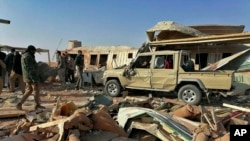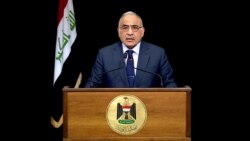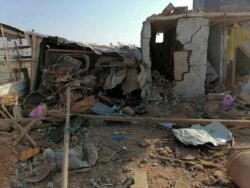The United States is defending the use of airstrikes on Sunday to target an Iranian-backed militia in Iraq and Syria, warning it could strike again, despite criticism from top Iraqi officials and renewed threats from the militia itself.
"We are not going to let Iran get away with using a proxy force to attack American interests," a senior State Department official told reporters Monday, describing the strikes as defensive in nature.
"It has been a feature of Iran's expansionist foreign policy to conduct deniable attacks," the official added. "We are not giving Iran the fiction of deniability any longer."
The U.S. airstrikes targeting Kataeb Hezbollah weapons storage facilities, and command and control locations across Iraq and eastern Syria, killed at least 25 people and injured dozens more.
U.S. officials said the strikes were in response to a rocket attack on an Iraqi military base on Friday which killed a U.S. defense contractor. Officials said the evidence left no doubt Kataeb Hezbollah was responsible.
The strikes have sparked anger and criticism by top Iraqi officials.
On Monday, Iraqi Prime Minister Adel Abdul Mahdi condemned the strikes, warning in a statement that the U.S. actions were unacceptable and "will have dangerous consequences."
A statement from the Iraqi government further chastised the U.S., describing the strikes as a "flagrant violation" of Iraq's sovereignty, as well as of the rules governing the "goals and principles" of the U.S.-led coalition in Iraq to fight and defeat the Islamic State terror group.
U.S. officials brushed aside such criticism and instead placed blame on Iraq for allowing Iranian proxies to operate at will inside their country despite 11 such attacks on U.S. and coalition forces in the past two months.
"We have warned the Iraqi government many times, and we've shared information with them to try to work with them to try to carry out their responsibility to protect us as their invited guests," a second senior U.S. official said. "They have not taken the appropriate steps."
The U.S. official also criticized Iraqi officials for failing to come down harder on Kataeb Hezbollah's activities, whether they involve sending militia forces into Syria to fight on behalf of Syrian President Bashar al-Assad or targeting Iraqi protesters.
"It's moments like this when you see people's true colors," he said.
Secretary of State Mike Pompeo spent Monday discussing the strikes with allies, including phone calls with Israeli Prime Minister Benjamin Netanyahu, Abu Dhabi Crown Prince Mohammed bin Zayed and Saudi Crown Prince Mohammed bin Salman. Pompeo reiterated the U.S. position that it stands ready to defend its interests and counter Iranian actions.
Saudi state media reported an official source condemning the Friday attack that killed the U.S. defense contractor.
Growing threat
Both Iraq and the United States are bracing for additional violence.
"Our battle with America and its mercenaries is now open to all possibilities," the Kataeb Hezbollah militia said in a statement late Sunday.
Kataeb Hezbollah, part of the state-sanctioned militias operating in Iraq known as the Popular Mobilization Forces (PMF), has denied responsibility for the Friday attack that killed the U.S. contractor. But it warned a response would be forthcoming.
"We have no alternative today other than confrontation, and there is nothing that will prevent us from responding to this crime," the statement said.
Iran's foreign minister Monday also condemned the airstrikes, calling them an "obvious case of terrorism."
Since May, the U.S. has sent an additional 14,000 forces to the Middle East, along with air and missile defense systems and additional reconnaissance capabilities, in response to what officials see as a growing threat from Iran and its proxies.
Officials said Monday that despite the buildup, the increased threat has yet to diminish.
"We do see threat streams and threatening activities by all these (Iranian-backed) forces that are of concern to us from a force protection standpoint," a senior State Department official said. "(Sunday's action) shows we can respond not just in Iraq, but we can respond anywhere that we think it makes sense to us and to the interest and security of our partners and allies."
U.S. officials also warned they planned to hit Iran with additional economic sanctions in the coming year, saying, "Iran's economic problems and challenges are going to compound in 2020."






